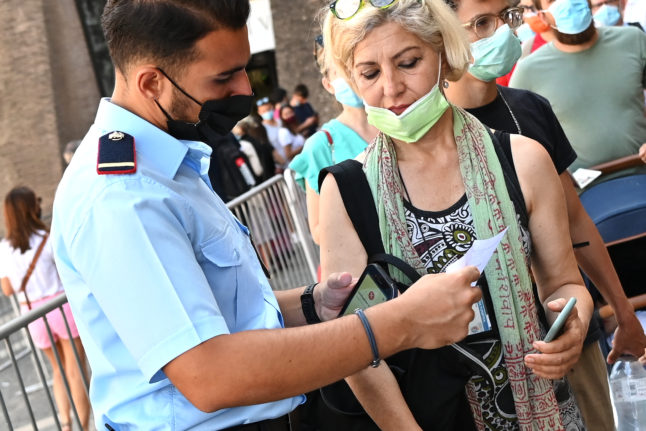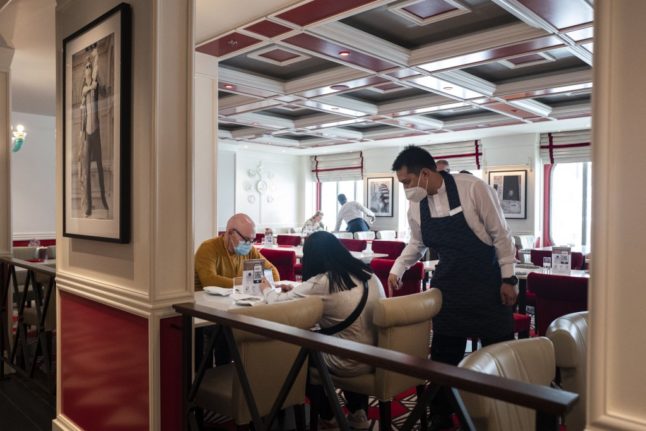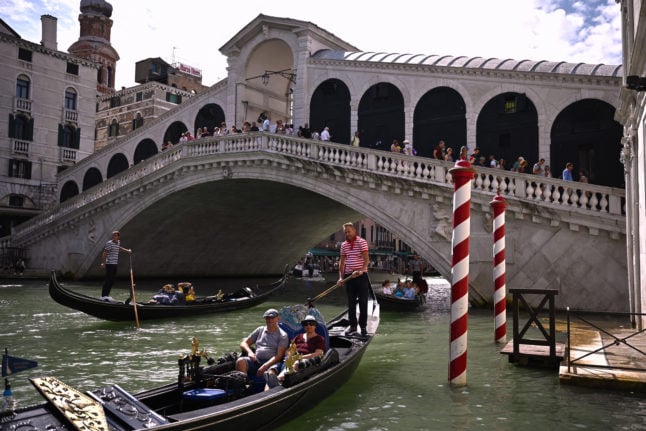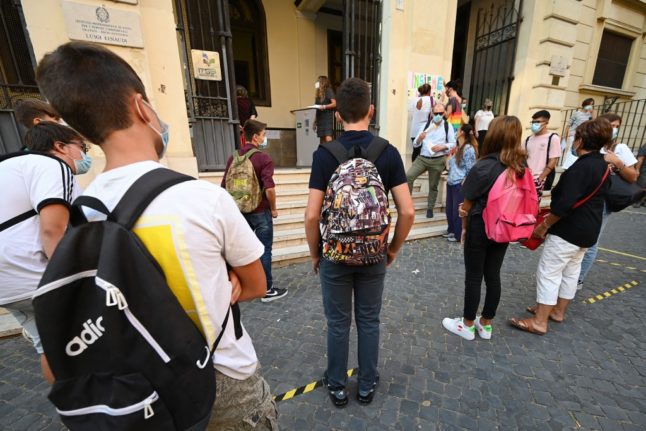As part of Italy’s plans to gradually phase out its Covid restrictions by the summer, the government is easing some rules for the month of April.
Further easing of restrictions is expected in May, and in June Italy is set to dispense with most of its restrictions altogether, in line with the government’s aim to start paving a path to normality.
Here are the rules in place from April 1st to April 30th according to the text of the government’s latest decree.
Note that the decree relates only to domestic health measures, ie: the rules once you’re in the country. If you’re looking for the latest news about Italy’s travel rules for international arrivals you can find that here.
Covid-19 green pass
Requirements for where and when people in Italy are required to show a Covid health pass, known in Italy as a ‘green pass’, change on April 1st.
Italy currently has two types of Covid pass: the ‘super’ or ‘reinforced’ green pass, which can only be obtained through vaccination or recent recovery from Covid-19; and the ‘basic’ green pass, which can also be obtained via a recent negative Covid test result from a pharmacy carried out in the preceding 72 hours (for PCR tests) or 48 hours (for rapid tests).
That means for those who aren’t vaccinated against Covid-19 or who haven’t recently recovered from the virus, a negative test result is required to access certain venues and facilities.
READ ALSO: Where you now need to show a Covid green pass in Italy

From April 1st to April 30th, the following venues in Italy require the super green pass:
- Indoor swimming pools, gyms, spas, sports centres, and communal showers and changing rooms, including in hotels.
- Cinemas, theatres, concert halls, and indoor sports arenas.
- Health and social care facilities, such as hospitals, doctors’ surgeries and residential care homes.
- Nightclubs and dance bars.
- Conventions and congresses.
- Indoor organised celebrations and festivities, including those that take place after any kind of official ceremony.
- Betting shops, casinos, and bingo halls.
- Indoor cultural, social and recreational centres.
- Indoor dining in canteens or restaurants, with the exception of hotel restaurants reserved exclusively for guests.
From April 1st to 30th, the following venues and services require a basic green pass:
- Aeroplanes, interregional ships and ferries (excluding connections to Puglia’s Tremiti Islands and along the Strait of Messina), interregional trains and coaches, and high-speed inter-city trains.
- Outdoor shows, sporting events and competitions open to the public.
- Public and private training courses.
- In-person prison visits and interviews.
That means that from April 1st, no green pass of any kind is required to use local public transport services, to dine outdoors at restaurants, to enter hotels, or to dine indoors in hotel restaurants that are reserved for guests.
READ ALSO: UPDATE: How Italy’s Covid green pass rules change for tourists in April
The green pass is also no longer required from April 1st in museums, shops, hairdressers and local offices (including bank branches and post offices).
Anyone accessing their workplace (both public and private sector workers) needs to have the basic green pass until April 30th.
Full vaccination along with a booster provides people with a ‘super green pass’ that has indefinite validity; for those who have undergone just the primary vaccination cycle or have recovered from Covid but not been vaccinated, the super green pass is valid for six months.
People who have been vaccinated in the EU or the UK should receive a QR code along with their certificate that can be scanned by authorities; for others, their foreign-issued vaccination or recovery certificates are considered equivalent to the super green pass and should give them access to all the same spaces.

Masks
Until recently, Italy has required high-grade Ffp2 masks in most situations.
This rule is somewhat relaxed from April 1st, with ordinary surgical (but not cloth) masks accepted in a wider range of circumstances.
The venues and services that continue to require Ffp2 masks from April 1st are:
- Planes, ships, ferries, and all other interregional and local public transport services
- School buses
- Enclosed cable cars and chair lifts, including at ski resorts.
- Performances open to the public held in theatres, cinemas, concert halls, and other entertainment venues, whether indoors or outdoors.
- Sporting events and competitions, both indoors and outdoors.
The venues and services where an ordinary surgical mask is accepted (and masks are required) from April 1st are:
- Nightclubs and discos, except for when people are dancing.
- All other indoor areas apart from private homes.
The only exemptions are for children under the age of six; people whose disabilities mean the use of a mask would obstruct their breathing and people working directly with disabled people in circumstances where the use of a mask would make communication unfeasible; and those engaged in sports activities.

Quarantine
From April 1st, Italy’s quarantine requirements are also relaxed.
Those who test positive for Covid themselves are required to self-isolate until they test negative for the virus with either a PCR or rapid antigen test.
People who are close contacts of someone who has tested positive for Covid, on the other hand, are not required to self-isolate, but must wear an Ffp2 mask whenever they are indoors, or outdoors in the presence of groups of people, for ten days from the last point of contact.
If a person who came into contact with a positive Covid case begins to develop symptoms, they should take a (PRC or antigen) test from a private provider as soon as the symptoms appear. If they test negative but they continue to present symptoms, they should take an additional test five days after the last point of contact with the positive case.
Venue capacity
The capacity of both indoor and outdoor sports arenas and stadiums will be restored to 100 percent from April 1st.
READ ALSO: What changes about life in Italy in April 2022

Schools
From April 1st, schools will also no longer employ class-wide distance learning or ‘DAD’ (didattica a distanza). That means full presence in class and the return of school trips and sports days, which have been cancelled for the past couple of years.
Quarantines will also be scrapped. From April, even if there are as many as four positive cases in a class – which until the end of March triggers DAD for the entire cohort – in-person lessons will continue. All those attending school will be required to wear Ffp2 masks for ten days from the last point of contact with a positive case.
Students who are in isolation due to their positive Covid status will attend class remotely via partial DAD set ups.
The requirement to wear masks, meanwhile, remains in force until the end of the school year – children under 6 years old remain exempt. Unless students have recently come into contact with a positive case, surgical masks as well as Ffp2 are accepted.
READ ALSO: How tourists and visitors can get a coronavirus test in Italy



 Please whitelist us to continue reading.
Please whitelist us to continue reading.
Member comments